We all want our buddies to live forever, and it’s one of the hardest parts of being a dog owner that they only stick around for a decade or maybe two. Luckily, a new anti-aging pill for dogs might get a few more years out of your fur baby.
Animal health company Loyal is moving through the FDA approval process with this new drug that it hopes will extend senior dogs’ lifespans and improve their quality of life in the final years. “Everything we do is in service of helping dogs live longer, healthier lives,” said Loyal Founder and CEO Celine Halioua. Here’s what you need to know about getting your pup the anti-aging pill for dogs.
What are the new anti-aging drugs for dogs?

Many companies have worked on longevity treatments for animals and humans, but we’ve never been quite this close to success. Though someday a similar product might work on us, for now, we get to celebrate that it could keep our pooches around for a bit longer. This particular pill will go to doggos that are over 10 years old and weigh more than 14 pounds. Small dogs that already have a longer life expectancy likely won’t benefit from these drugs currently being tested.
How does the anti-aging pill work?
We’ve known for a while now that calorie restriction will keep your dog kicking longer, but who wants to take food away from Fido? Instead, these pills target metabolic dysfunction and work to improve our pup pup’s life while slowing or preventing the onset of diseases, such as cancer and arthritis. Initial research has shown promise, and the current clinical trial includes 1,000 dogs with some that get the med and others that get a placebo.
When will these medications be available for dogs?
Loyal has a pill currently in testing with the hopes that it will begin to get it into the hands of owners for under $100 per month (pricing is not officially set yet). Right now, the FDA has declared the drug has a “reasonable expectation of effectiveness,” which represents an important step toward making it available to pups. It could hit the shelves (or the vet’s office more likely) in 2026. As with all medications, you’ll want to discuss this drug and other longevity solutions with your vet before starting it on your beastie.
No matter how good these pills get, they won’t replace a healthy diet and exercise, not to mention mental stimulation and socialization. All of these are vital to longevity and happiness. If your furry friend has more years with you, that means it’s even more important to fill them with lots of walks and playtime. Hopefully, we’ll soon have a way to get just a little bit more time together with our four-leggers.




